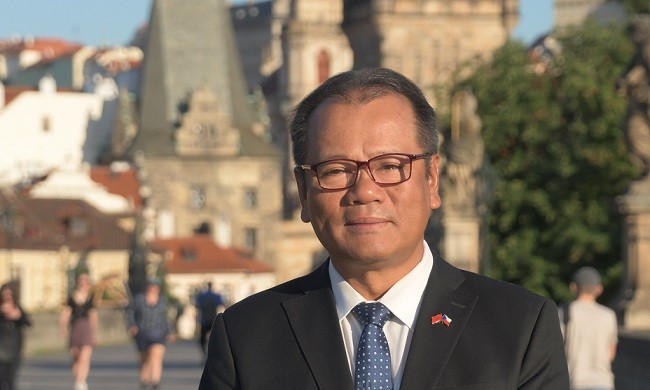
Vietnamese community in the Czech Republic and people in Vietnam with experience from Czechia are the basis of successful relations
Latest
 |
| Ambassador of Vietnam to the Czech Republic Thai Xuan Dung. (Photo: HL) |
Currently in Vietnam, there are over 200,000 people who have studied or worked in the Czech Republic. Some of them hold key roles in public administration or state enterprises. On top, there is a strong Vietnamese community of around 90,000 members in Czechia. In the interview for TRADE NEWS, Ambassador Thai Xuan Dung talked about how this specific factor translates into mutual business relations and what industries offer the best opportunities for Czech companies in Vietnam.
What is the current position of the Vietnamese community in our country?
Today, Vietnamese form the third largest minority in the Czech Republic after Ukrainians and Slovaks. I am convinced that they are seen as an example of assiduity, dynamism, creativity and a willingness to gradually get past the language barrier in order to integrate more deeply, widely and sustainably into Czech society. The majority of Vietnamese people in the Czech Republic are employed and have steady incomes, many of them have achieved great success in various fields, from business to medicine or culture. More and more members of the Vietnamese community have university degrees and some even lecture at universities.
Many Vietnamese associations also operate in the Czech Republic - their members consist of intellectuals and businesspeople from Vietnamese-Czech multicultural families. The associations are created to teach Vietnamese and spread Vietnamese culture, including traditional festivals.
All this surely contributes to building mutual business relations between our countries. How do you perceive it?
There are a lot of successful Vietnamese businesspeople in the Czech Republic, which is representing good reputation for Vietnam, contributing significantly to fostering trade and business cooperation between our two nations.
In addition, there are more than 200,000 people living in Vietnam who previously studied and worked in your country. These people with experience from the Czech Republic, along with the Vietnamese community here, are acting as emissaries and bridges connecting our two countries and have contributed greatly to fostering the long-standing traditional friendship and multi-faceted co-operation between Vietnam and the Czech Republic.
Speaking of trade figures, Vietnam is one of the Czech Republic's top non-EU partners, while your country currently ranks 49th out of 139 countries and territories investing in Vietnam with 41 investment projects and a total registered capital of more than 92 million USD, focusing on the fields of real estate, beer, building and electrical equipment.
| TIN LIÊN QUAN | |
| Vietnam seeks to foster relations with Czech Republic: CPV delegation | |
Double-digit growth in mutual trade
The EVFTA, i.e., a Free Trade Agreement between the EU and Vietnam, will certainly help further develop our successful trade relations. Can you briefly introduce it to our readers? What are the main advantages it brings to our mutual trade?
The EVFTA came into force on August 1, 2020, and the Czech Republic was the first EU member state to ratify it. The Agreement has gradually removed restrictions on trade and investment, including import taxes and tariffs. As a next-generation free trade agreement, it guarantees that the interests of both parties are balanced, while also having high and comprehensive standards and a broad and deep degree of commitment. We believe that the EVFTA will eliminate up to 99% of tariffs on trade in goods between the two parties in the coming years.
Thanks to the EVFTA, Czech businesses can easily access the Vietnamese market of 100 million consumers, increasing investment, creating more jobs, and promoting trade with one of Asia's most dynamic economies, which is also an important gateway to the dynamically developing Southeast Asia region with more than half a billion people.
And we can see the first results already: since the implementation of the agreement in 2020, despite the covid pandemic and the war in Ukraine, the two-way trade turnover between Vietnam and the Czech Republic during the period from 2020 to 2022 has consistently increased at a double-digit rate, key export products from Vietnam such as textiles, footwear and seafood recorded positive growth with year-on-year increases of 24%, 19% and 41%, respectively.
Where do you see the greatest potential for Czech companies in the Vietnamese market in the future?
Recently, Czech businesses have shown a strong interest in collaborating with Vietnamese partners especially in the areas of energy and renewable energy, mining, transportation, automotive, cyber security or defence industry. Most recently, a collaboration deal for the development of SKODA assembly and production facility in Quang Ninh, Vietnam, was signed by the SKODA Group and Thanh Cong Auto (A Vietnamese company). Additionally, Vietnam Airlines and F Air signed an agreement regarding pilot training in Vietnam.
In light of the above-mentioned facts, I think that Czech companies have numerous chances to gain market share in Vietnam in many of these sectors or in others, such as engineering, precision mechanics, technology transfer, medical equipment, but also food processing industry, financial services or tourism.
A fast-growing energy market
You mentioned the significant opportunities in the energy sector, as demand for energy is going up in Vietnam along with the growing industrialization. What are the most promising areas of the energy mix and energy infrastructure for Czech companies to supply their products and services?
Vietnam is on its track to become one of the fastest-growing energy markets in Asia. Vietnam's Ministry of Industry and Trade estimates that as the country's economy develops, its annual increase in energy consumption will be between 8 and 10%.
Vietnam has the most potential for wind power in Southeast Asia, with a total capacity of 513,360 MW, 200 times greater than the capacity of the Son La hydropower plant, and more than ten times the estimated total capability of the Vietnamese electricity sector. According to data from the Global Energy Monitoring, Vietnam will likely place among the top 20 nations with the greatest potential for wind and solar power by January 2023.
In addition, our country is committed to achieving carbon neutrality by 2050. For all these reasons, it gives maximum priority to the development of the energy sector, especially renewable sources. However, in this area, Vietnam is at the level of a developing country that does not have much experience, and therefore needs the help and support of other countries, especially industrialized countries such as the Czech Republic, in terms of capital and technology.
| More from WVR |
 Czech Prime Minister’s visit expected to lift bilateral ties to new heights: Ambassador Czech Prime Minister’s visit expected to lift bilateral ties to new heights: Ambassador |
What is the competitive environment like in the energy sector in your country?
Businesses from Denmark, Japan, the USA, Germany, the UK, France, Australia or Korea are currently Vietnam's primary partners in the implementation of renewable energy projects, there for the competition is so tough while our potential is so great as well.
Czech suppliers can participate in public tenders, and they can select appropriate areas to participate based on their capacity. Specifically, large businesses can participate in direct bidding while smaller businesses can consider subcontracting for bigger Czech or foreign businesses. Hopefully, the recent talks between representatives of the Vietnamese Coal and Mineral Corporation and the ČEZ and ČEPS groups, as well as EVN, will result in real prospects for business collaboration.
Vietnam is looking for better quality food
Regarding the food industry: Vietnam has overtaken the far more populous India and ranks among the world's five largest importers of apples, with hundreds of thousands of tons of apples per year. Your country also imports big amounts of vegetables, such as potatoes, garlic and carrots, and mushrooms. Is this also a good opportunity for Czech exporters?
According to Eurostat data for 2021, our country is indeed one of the top importers of raw apples globally, with 42% of them coming from New Zealand, 27% from the US and 13% from China. The data also reveals that even though China is closer to Vietnam than New Zealand or the US, which are geographically further away and must incur greater transportation and logistics costs, Chinese apples are exported to Vietnam at a lower rate.
Chinese agricultural products flood the Vietnamese market as a result of fierce price competition, even though the quality occasionally falls short of what consumers expect. The standard of living in Vietnam is rising at the moment and as the number of people with high and medium incomes also are increasing, they care more about food quality, safety, hygiene and the country of origin. In addition, Vietnamese people have the custom of purchasing imported fruits as gifts for family and friends. Czech companies therefore have a good chance of succeeding in the Vietnamese market in this segment as well, if they could deliver products with EU quality standards at competitive prices.
However, Czech exporters must recognize that both for apples and for other frequently imported products such as garlic, mushrooms, potatoes and carrots, there is an intense competition in the Vietnamese market. The suppliers of these goods are usually long-term partners with established distribution channels.
Previously, Czechoslovakia was one of the major suppliers of "turnkey" investment units to countries such as Vietnam. Is this still a realistic business plan in Vietnam, given the competition from large multinational companies?
Yes, in the past, investment projects in Vietnam and other countries were indeed negotiated through Government-to-Government (G2G) agreements in a turnkey fashion, and thanks to them, many hospitals and factories were built in our country. Although these buildings often serve a different purpose today, they continue to be priceless monuments of the cooperation between Vietnam and those countries.
Contrary to the past, the majority of investment projects today are carried out between businesses (B2B). However, a handful of significant infrastructure or public utility projects will be carried out between businesses and the government (B2G) through public-private partnerships (PPP). Regardless of the format, all business initiatives must adhere to local, bilateral, multilateral, and international laws and be open, transparent, and of course highly competitive.
It is clear that the EVFTA and particularly the EU-Vietnam Investment Protection Agreement (EVIPA) have improved the regulatory climate for EU and Vietnamese companies in selecting business investment models to maximize each party's trade and business cooperation's advantages.
From our conversation, it is evident that there is great potential for Czech companies to succeed in Vietnam. Hopefully, we will see a continuing growth in cooperation and mutual trade between our countries.









